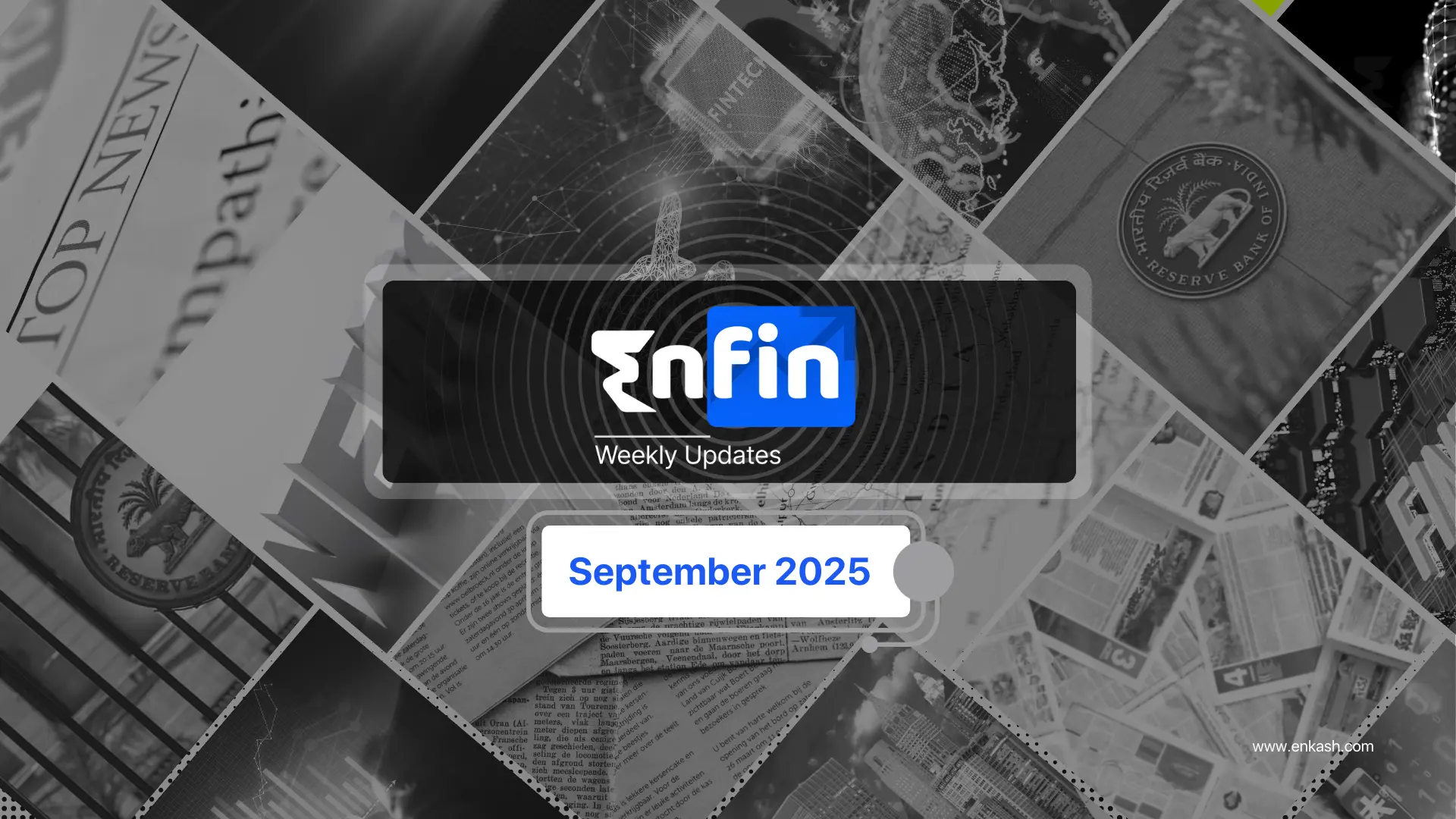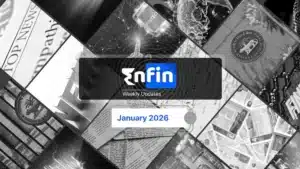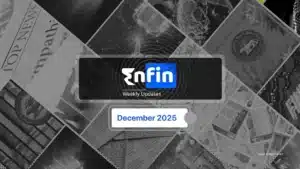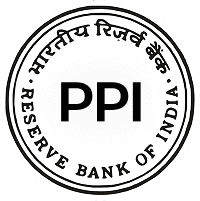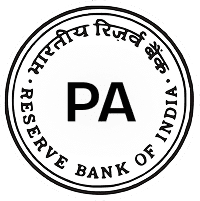With EnFin, we bring you timely insights into the fintech sector, covering new announcements, policy decisions, and emerging market dynamics. This edition of our blog compiles the standout updates from recent weeks, helping you stay on top of the industry’s rapid pace.
Odisha Launches “BharatNetra” & FinTech Capability Hub
Odisha CM Mohan Charan Majhi launched the “BharatNetra” initiative and the Integrated Global FinTech Capability Hub (I-GFTCH) with NUS and GFTN. The program will train 7,000 students over five years, starting with 375 seats in September. Aligned with Odisha’s Vision 2036 and Viksit Bharat 2047, it aims to create fintech talent, support startups, and position the state as a global hub.
Originally posted by The Times of India
PM Announces Fintech Reforms at ET World Leaders Forum
At the ET World Leaders Forum, PM Narendra Modi announced reforms to strengthen fintech. The agenda includes simplifying regulations, boosting financial inclusion, enhancing cybersecurity, and protecting investors. These measures are expected to reduce compliance friction and build a leaner, more resilient, and inclusive digital finance ecosystem that fosters innovation while safeguarding systemic stability.
Originally posted by Economic Times
India Opens Banking Sector Wider to Global Investors
India is gradually easing restrictions on foreign participation in banking. LIC’s reclassification in IDBI Bank and RBI’s approval of SMBC’s 24.99% stake in Yes Bank highlight the push toward attracting global capital. The shift is expected to increase competition, deepen integration with global markets, and reshape India’s fintech-banking ecosystem.
Originally posted by Financial Times
Fintech Reforms in Focus
Following the PM’s announcement, discussions point to major fintech policy shifts. Proposals include allowing NBFCs to issue UPI credit, reviving New Umbrella Entities, introducing no-action letters for regulatory clarity, and exploring digital bank licenses. Together, these changes could make India’s financial system more resilient, competitive, and accessible.
Originally posted by Economic Times
ICAI to Introduce Audit Standards for Digital-First Firms
The Institute of Chartered Accountants of India (ICAI) has announced plans to introduce new Information Systems Audit Standards. These will be designed specifically for tech-heavy businesses, including fintech startups, to strengthen accountability and ensure robust IT system assessments.
Originally posted by The Economic Times
Real-Money Gaming Ban Hits Fintech Firms
India’s ban on real-money gaming is expected to significantly impact fintech players. Digital payment processors could lose an estimated ₹20,000–30,000 crore in monthly transaction volumes. Regtech startups may also see reduced demand as gaming platforms scale back on KYC and compliance services.
Originally posted by Mint
Chandigarh’s Vision for a Fintech & Service Innovation Hub
Chandigarh is planning an “International Service Hub” across 153 acres in its Industrial Area Phase III. The hub will integrate fintech, clean-tech, knowledge outsourcing, MSMEs, and advanced logistics. Modeled partly on GIFT City but broader in scope, the initiative aims to leverage local talent, attract global investors through roadshows, and align with central schemes to build a competitive ecosystem.
Originally posted by The Times of India
Satellite Fintech Hubs: India’s Next Move
A parliamentary standing committee has proposed the creation of satellite financial innovation zones in major Indian cities to complement GIFT City’s IFSC. These fintech clusters are expected to foster inclusive growth, nurture regional talent, diversify investor appeal, and expand India’s role in global finance. If implemented, this could democratize access to fintech infrastructure and encourage more balanced regional development.
Originally posted by The Economic Times
RBI Holds Repo Rate at 5.5% to Balance Growth Amid Global Risks
On August 6, 2025, the Reserve Bank of India (RBI) kept the repo rate steady at 5.5%, maintaining a neutral stance. The central bank downplayed U.S. tariff concerns while noting easing inflation and stable growth forecasts. For fintechs, this stability supports borrowing costs and credit transmission, though cautious lending could temper aggressive expansion strategies.
Originally posted by Deccan Chronicle
UPI Sets New High: Daily Transactions Surpass 700 Million
On August 2, 2025, India’s UPI system recorded 707 million transactions in a single day, doubling volumes compared to 2023. This milestone underscores UPI’s dominance in digital payments and is intensifying calls to reintroduce the Merchant Discount Rate (MDR) to ensure long-term financial sustainability for ecosystem players.
Originally posted by Financial Express
RBI’s Tighter Co-Lending Rules May Slow Down Fintech Partnerships
India’s co-lending ecosystem—estimated at over ₹1 lakh crore—could face headwinds under new RBI guidelines. The rules mandate deeper tech integration between banks and NBFCs, raising compliance challenges and prompting a possible shift toward direct loan assignments. While fintech firms may feel the strain, smaller lenders with stronger tech capabilities could emerge as winners.
Originally posted by The Economic Times
UPI Isn’t Free Forever and Someone’s Already Paying: RBI Governor
RBI Governor Sanjay Malhotra reiterated that UPI, though free for end users, incurs significant operational costs. Currently subsidized by the government, these costs are beginning to show strain as private banks like ICICI introduce charges for aggregators. This adds to the debate over the sustainability of UPI’s zero-fee model.
Originally posted by The New Indian Express
IRCTC Subsidiary Secures RBI In-Principle Nod to Become Payment Aggregator
IRCTC Payments, a wholly owned arm of Indian Railways Catering and Tourism Corporation (IRCTC), has received in-principle approval from the RBI to operate as a payment aggregator. This authorization will enable the subsidiary to process digital payments via UPI, cards, and wallets, strengthening margins and improving efficiency in online ticketing transactions.
Originally posted by Moneycontrol
Balance checks limited to 50 per day
UPI apps like PhonePe, GPay, and Paytm will now allow only 50 balance enquiries per day, per account. This cap applies to both manual checks and background queries. The move is meant to ease pressure on bank servers, which were often strained due to excessive balance checks.
Originally posted by India Today
Bank account list capped at 25 views daily
Users can now check the list of bank accounts linked to their mobile number only 25 times per day, per app. This limit is designed to prevent unnecessary refreshes that contribute to system load.
Originally posted by Economic Times
Autopay restricted to non-peak hours
Recurring payments such as EMIs, SIPs, OTT subscriptions, and bill payments will only be processed during off-peak hours: before 10 AM, between 1 PM and 5 PM, or after 9:30 PM. NPCI has stated that this change will help keep the network stable during high traffic periods.
Originally posted by Hindustan Times
Autopay given 1 attempt + 3 retries
Each autopay mandate will get one main debit attempt and up to three retries if it fails, making a total of four attempts. After that, the transaction will lapse. This helps prevent failed debits from overloading the system with unlimited retries.
Originally posted by Hindustan Times
Pending transactions: status checks limited
When a payment is stuck in “pending” status, users can now check its progress only three times, with a mandatory 90-second gap between each attempt. This change discourages constant refreshing, which previously created unnecessary transaction queries.
Originally posted by NDTV
Inactive UPI IDs auto-disabled after 12 months
If a UPI ID remains unused for more than a year, it will be automatically disabled by NPCI. This measure protects users in case their mobile number is reassigned to someone else.
Originally posted by Trade Brains
Tighter authentication for new bank accounts
Adding a new bank account to a UPI app will now involve enhanced verification and stronger authentication protocols. The change is intended to minimize the risk of unauthorized account linking.
Originally posted by Economic Times
This month’s updates highlight both the opportunities and challenges shaping fintech in India. Regulatory shifts, payment milestones, and new market entrants are collectively redefining how financial services operate.
Stay informed, stay ahead. Follow us on LinkedIn to never miss our weekly fintech insights.

